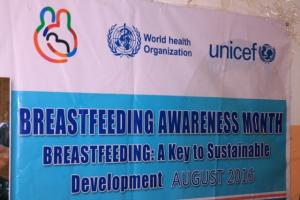“Breast feeding, “Support mums to breastfeed anytime, anywhere”
World Breast feeding week was observed in The Gambia, from 1st to 7th August 2015. The Ministry of Health and Social Welfare (MOH&SW), through the National Nutrition Agency (NaNA), in collaboration with WHO, UNICEF and other partners came up with activities to sensitize the public especially so, employers and their women employees on the importance attached to breastfeeding.
This year, WHO is encouraging people to “Support mums to breastfeed anytime, anywhere,” as all of society has a role to play in making our communities more breastfeeding-friendly.
At a press briefing organized before the launching of Breast-feeding week, Mr. Pa Modou Phall, Executive Director National Nutrition Agency (NaNA), thanked WHO, UNICEF and other partners for making this day a success to kick start the observance of World Breast Feeding Week to show case how far the country has gone in breast feeding practices and what more needs to be done for a greater success.
Mr. Phall reminded the gathering that the reason why the week has been set aside needs to be reflected upon as universally breast-feeding is accepted and the right mode of feeding an infant and this has been the culture from the time of our great grandparents to our present day. He therefore urged everyone to protect and promote this culture for the future generation for posterity.
He noted that breastmilk is the foundation for an infant that bond mother-to-child and must not be missed by any new-born in its nutrition uptake. He cited breastfeeding action when the mother feeds her baby both looking reassuringly into the eyes of the other as one of the most joyous moments of one’s life, creating a lifelong relationship between the two.
He challenged that there is no institution or scientist who can mimic breastmilk as this is natural and god given with no added nutrients and should therefore not be carried away with the powered milk which is in dried form.
He stressed that it is the fundamental human rights of every child to be breastfed by her mother and what we are advocating is exclusive breastfeeding for the 1st six months without even water, a call that started in 1992 when the % for breastfeeding was zero.
He highlighted that with vigorous advocacy country-wide through activities and programmes designed by NaNA with support from UN sister agencies and the Association of Health Journalist, a lot has been achieved reaching 48%, 2% less than the WHO 50% target but will not relent in our efforts to surpass the target. He stated that their main task is to ensure that every child is given the opportunity to be breastfed exclusively for six months and breastfed alongside complementary feeding for even 2 years and beyond.
He appealed to the audience to be equipped with the relevant information on breastfeeding as they will be ambassadors of the country to promote and nurture the culture of breast feeding.
In a joint WHO/UNICEF statement, Mr. Alpha Jallow extended best wishes from UN partners on this very important event. He noted that breastfeeding is the single most important health intervention and the best source of nutrition for babies.
Mr. Jallow stated that there is no substitute that can replicate breast feeding, which is why WHO recommends breastfeeding exclusively for the first 6 months of life, to begin within one hour of birth. He added that nutritious complementary foods should then be added while continuing to breastfeed for up to two years or beyond
He highlighted that while breastfeeding rates have increased in all regions of the world, global progress has stalled and we are yet to reach the global target set by the World Health Assembly of increasing exclusive breastfeeding rates for children less than six months of age to at least 50 per cent by 2025.
He reported that breastfed children fall sick less often, so their mothers are also less frequently absent from work with in-creased job satisfaction and greater loyalty to their employers.
Mr. Jallow finally called on governments to take the lead by making breastfeeding a policy priority in national development plans, increasing resources for programming that supports breastfeeding, and working with communities and families to promote the full benefits of breast-feeding to tackle all the barriers to breastfeeding.
He thanked government and partners for their support in ensuring good and adequate breast feeding practices not-ing that our challenge now is to make breastfeeding work in the workplace, too. Together, we can help working women to breastfeed and reap the benefits for themselves, for their children, and for the health and well-being of future generations, he concluded.
The Permanent Secretary, Mrs. Saffie Lowe Ceesay deputizing for the Hon. Minister, Omar Sey officially launched Breastfeeding week 2016 at the Sere-kunda Hospital.
She commended the strive in ensuring that breastfeeding is given the attention it deserves and that instead of a weeklong sensitization, the Government of The Gambia will use the month to reach the entire country through radio programmes, community gatherings where breast-feeding messages will be shared using Traditional Communicators as well as promoting existing information materials.
She tasked the audience to involve their partners to make exclusive breastfeeding a reality and save the lives of many children. She note that in order to achieve this adequate breastfeeding counselling and support are essential for mothers and families to initiate and maintain optimal breastfeeding practices.
She called on partners to continue working together to support mothers to be able to breastfeed anytime, any-where to build up a health nation.
Present in both events were senior government officers, UN staff and other partners in health.
______________________________________
For more details, please contact:
Mr. Momodou Gassama, Health Promotion Officer, gassamam [at] gm.afro.who.int (gassamam[at]gm[dot]afro[dot]who[dot]int)—(+220)- 4462286
Mr. George. Williams, Health Information Assistant, williamsg [at] gm.afro.who.int (williamsg[at]gm[dot]afro[dot]who[dot]int)—(+220) 4462284



